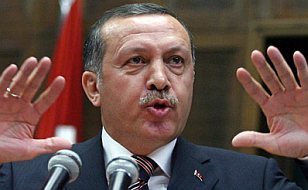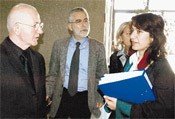State Regards Own Citizens as Foreigners
Minority law expert lawyers Kezban Hatemi and Murat Cano have said the Council's report is in breach of the Constitution while Prof.Dr. Baskin Oran, a lecturer at the Ankara University Political Sciences Faculty said any student who made a classification similar to the report would have repeatedly failed classes.
The State Supervisory Council (DDK/Devlet Denetleme Kurulu) is attached to the Office of the Presidency of the Republic and has some special power in every kind of state supervision.
Speaking to bianet on the DDK's Report Examining the Practices of Foreign National Real Persons and Commercial Companies of Corporate Nature Set Up in Foreign Countries Obtaining Immovable Property Inside The Borders of The Republic of Turkey, Hatemi described the classification in the text as "in only one word, a disgrace".
"A foreigner is a person who is not a citizen of the Republic of Turkey" Hatemi explained. "Foundations of congregations are foundations set up by people who are citizens of the Republic of Turkey coming together. This classification shows non-Muslim citizens of the Republic of Turkey as if they were foreigners".
She said the DDK, a constitutional supervisory institution established with the aim of performing and developing the regular and efficient functioning of the administration and its observance of law, needed first to supervise its own mentality in accordance with the Constitution.
"From the President to the individual, the Constitution is binding for everyone. The classification in this report is a constitutional offence. This mentality which defines those inside of it as foreigners is the obstacle in front of democracy" she said.
Adding, "The President should also condemn this. The minorities could use their right to petition and write to the President and condemn this".
Cano: State not based on religion or race
Lawyer Cano referred to the classification as "an illiterate exercise" stressing "The Constitution determines that the state is not founded on race of religion, that citizens are equal in rights and freedoms."
"Minority foundations are not foreign legal entities. Because they are institutions of the Republic of Turkey that are accepted as legal entities according to the laws of the Republic of Turkey. All of their executives are citizens of the Republic. Whatever rights and licenses the foundations set up by Turkish Republic citizen Muslims have, the minority foundations have the same rights and licenses".
Oran: Citizenship of Turkey important
Prof. Dr. Oran said the situation with regard to the report and its classification further showed how the concept of "being a citizen of Turkey" as they recommended in the Minority and Cultural Rights Working Group Report was important.
"Because, [the concept of] Turk signifies an ethnic group, not a nation. When this is the case we continuously come across things like this" he said.
"This way, the non-Muslims are formally being left out of the concept of citizenship. As Etyen Mahcupyan says, it leads not to being a non-Muslim but to being a non-citizen.
How Foundations became 'Foreign'
The Fourth Section of the DDK report titles "The Obtaining of Immovable Property in Turkey by Foreign Real Entities" lists among those entities those minority foundations formed in Turkey. A section of the report on corporate ownership also lists the foundations alongside companies of foreign capital or foreign companies.
The report describes "congregation foundations" as institutions set up by people of the same religion or race, aiming to serve their communities and allowed to obtain property in Turkey under permission of the General Directorate of Foundations to meet their requirements in religious, educational, social and cultural fields.
The report cites the foundations in Turkey as belonging to Turkish Orthodox, Greek, Armenian, Jewish, Bulgarian, Georgian, Assyrian, Maruni and Keldani people saying that as of December 31, 2004, they had a total of 161 congregation foundations in Turkey and that 159 of these had immovable property "in the borders of our country".
In an explanatory part of the DDK report, it is stated that the immovable property of congregation foundations in Turkey are divided into 5 groups based on the number of property and their size. According the property of Greek, Armenian, Jewish and Assyrian congregations are listed under their own names and individually while the Turkish Orthodox, Keldani, Maruni, Bulgarian and Georgian congregation properties are listed as "others".
The report says that 1.427 immovable properties with known surface areas belong to 142 congregation foundations in Turkey and these are 2.584.763 m2 in total. Of the 1.427; 650 (%45.6) belong to Greek foundations, 510 (%35.7) to Armenian, 122 (%8.5) to Assyrian, 113 (%7.9) to Jewish and 32 (%2.2) to the 'others'. (TK/II/YE)
KURDISH QUESTION
PKK Ceasefire to be Terminated on 31 October?

KCK CASE
Court Dismissed Request for Defence in Kurdish

7th Istanbul Gathering for Freedom of Thought

CONSTITUTIONAL AMENDMENTS
58 Percent Said "Yes" to Constitutional Reform Package

Rights Organizations 3 Years ahead of Foreign Minister









